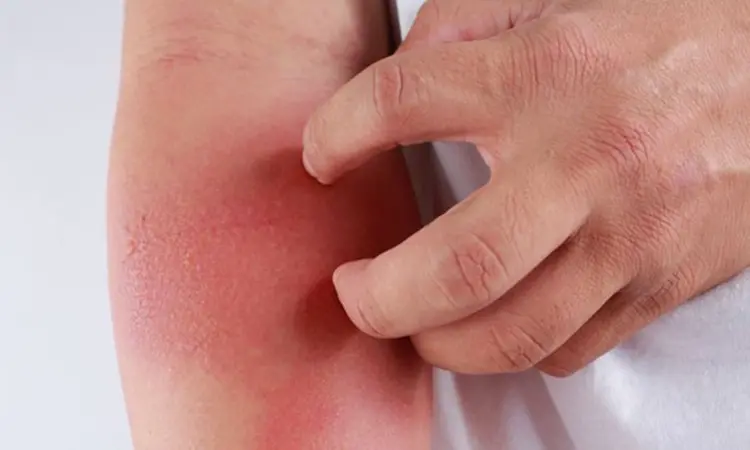- Home
- Medical news & Guidelines
- Anesthesiology
- Cardiology and CTVS
- Critical Care
- Dentistry
- Dermatology
- Diabetes and Endocrinology
- ENT
- Gastroenterology
- Medicine
- Nephrology
- Neurology
- Obstretics-Gynaecology
- Oncology
- Ophthalmology
- Orthopaedics
- Pediatrics-Neonatology
- Psychiatry
- Pulmonology
- Radiology
- Surgery
- Urology
- Laboratory Medicine
- Diet
- Nursing
- Paramedical
- Physiotherapy
- Health news
- Fact Check
- Bone Health Fact Check
- Brain Health Fact Check
- Cancer Related Fact Check
- Child Care Fact Check
- Dental and oral health fact check
- Diabetes and metabolic health fact check
- Diet and Nutrition Fact Check
- Eye and ENT Care Fact Check
- Fitness fact check
- Gut health fact check
- Heart health fact check
- Kidney health fact check
- Medical education fact check
- Men's health fact check
- Respiratory fact check
- Skin and hair care fact check
- Vaccine and Immunization fact check
- Women's health fact check
- AYUSH
- State News
- Andaman and Nicobar Islands
- Andhra Pradesh
- Arunachal Pradesh
- Assam
- Bihar
- Chandigarh
- Chattisgarh
- Dadra and Nagar Haveli
- Daman and Diu
- Delhi
- Goa
- Gujarat
- Haryana
- Himachal Pradesh
- Jammu & Kashmir
- Jharkhand
- Karnataka
- Kerala
- Ladakh
- Lakshadweep
- Madhya Pradesh
- Maharashtra
- Manipur
- Meghalaya
- Mizoram
- Nagaland
- Odisha
- Puducherry
- Punjab
- Rajasthan
- Sikkim
- Tamil Nadu
- Telangana
- Tripura
- Uttar Pradesh
- Uttrakhand
- West Bengal
- Medical Education
- Industry
Seladelpar Improves Pruritus in Patients with Primary Biliary Cholangitis by reducing IL-31, shows trial

USA: Newly released data from a post-hoc analysis of the Phase 3 ENHANCE study has demonstrated the impact of seladelpar on serum interleukin-31 (IL-31) levels and its correlation with pruritus improvement in patients with primary biliary cholangitis (PBC). Seladelpar is a first-in-class oral, selective PPARδ agonist being investigated for the treatment of patients with PBC.
The latest findings, published in the open-access journal Hepatology, are the first peer-reviewed published report of a correlation in decreases in IL-31, bile acids and pruritus symptoms in PBC following treatment with an investigational agent.
"In PBC patients, seladelpar decreased serum IL-31 and bile acids," the researchers reported. "The reductions of bile acids and IL-31 closely correlated with each other and pruritus improvement indicating a mechanism to explain seladelpar's anti-pruritic effects."
Pruritus is a debilitating symptom for many patients with primary biliary cholangitis, a rare, chronic inflammatory liver disease primarily affecting women. The most common early symptoms of PBC are fatigue and pruritus (itching), which can be debilitating for some patients. Progression of PBC is associated with an increased liver-related mortality risk.
In studies with seladelpar, a selective PPAR-delta agonist, PBC patients experienced significant pruritus improvement and reduction of serum bile acids. Interleukin-31 is a cytokine known to mediate pruritus and blocking IL-31 signalling provides relief in pruritic skin diseases.
Andreas E Kremer, University of Zürich, Zürich, Switzerland, and colleagues aimed to examine the connection between seladelpar's anti-pruritic effects, IL-31 and bile acid levels in PBC patients.
For this purpose, the researchers quantified IL-31 levels in serum samples from the ENHANCE study of patients with PBC receiving daily oral doses of placebo (n=55), seladelpar 5 mg (n=53) or 10 mg (n=53) for 3 months and healthy volunteers (n=55). IL-31 levels were compared with pruritus using bile acid levels and a numerical rating scale (NRS, 0-10).
The study revealed the following findings:
- Baseline IL-31 levels closely correlated with pruritus NRS (r=0.54), total (r=0.54) and conjugated bile acids (up to 0.64).
- Reductions in IL-31 were observed with seladelpar 5 mg (-30%) and 10 mg (-52%) versus placebo (+31%).
- Patients with clinically meaningful improvement in pruritus (NRS≥2 decrease) demonstrated greater dose-dependent reductions in IL-31 compared to those without pruritus improvement (NRS<2 decrease).
- Strong correlations were observed for the changes between levels of IL-31 and total bile acids (r=0.63) in the seladelpar 10 mg group.
"Pruritus is a debilitating symptom for many people living with PBC, yet the underlying mechanism of the itch is not well understood," said Andreas Kremer MD, Ph.D., MHBA, Professor and Head of Hepatology, University Hospital Zurich and primary author of the study.
"These latest data are critical in advancing our understanding of potential mediators of cholestatic itch and suggest that IL-31 may have a role in driving pruritis in people with PBC. While current treatments for cholestatic pruritus remain limited, these data can help inform potential novel therapeutic approaches."
Reference:
Kremer AE, Mayo MJ, Hirschfield GM, Levy C, Bowlus CL, Jones DE, Johnson JD, McWherter CA, Choi YJ. Seladelpar treatment reduces interleukin-31 and pruritus in patients with primary biliary cholangitis. Hepatology. 2023 Dec 20. doi: 10.1097/HEP.0000000000000728. Epub ahead of print. PMID: 38117036.
Dr Kamal Kant Kohli-MBBS, DTCD- a chest specialist with more than 30 years of practice and a flair for writing clinical articles, Dr Kamal Kant Kohli joined Medical Dialogues as a Chief Editor of Medical News. Besides writing articles, as an editor, he proofreads and verifies all the medical content published on Medical Dialogues including those coming from journals, studies,medical conferences,guidelines etc. Email: drkohli@medicaldialogues.in. Contact no. 011-43720751


